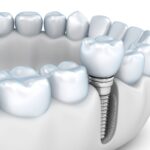If you lose one or more teeth, you might struggle with your usual oral functions, like chewing or speaking. You might also feel self-conscious about gaps in your smile. But you might not realize that missing teeth can put your jawbone at risk.
Fortunately, your dentist can recommend tooth replacement treatment through implant dentistry to replace missing teeth and protect your jawbone health. But what makes implants the ideal way to preserve jawbone and restore your smile after tooth loss? Learn more about how missing teeth can cause issues with your jaw and how implants can prevent them when you read on.

What Happens to the Jaw If You Lose a Tooth?
A healthy dental patient has a full set of teeth. Each tooth features a root that extends below the gums to reach the jawbone. The root stimulates the bone there, which keeps it strong and stable.
If a patient loses a tooth, the jawbone no longer receives stimulation. In the tooth root’s absence, the bone begins to deteriorate. The jawbone will shrink and weaken, which can lead to further dental damage as well as the appearance of facial sagging.
You cannot stop this effect of tooth loss on your own. You should discuss tooth replacement treatments that can preserve your jawbone with your dentist as soon as you can.
How Do Dental Implants Preserve Jawbone Health?
Removable dentures and similar tooth replacement solutions will replace teeth only above the gumline. So if you want to protect your jawbone in the wake of tooth loss, you should talk to your dentist about dental implants.
These devices feature a titanium post anchor that the dentist surgically inserts into the jaw. As you heal from the surgery, the anchor fuses with the jawbone to establish a solid foundation that will support the prosthetic teeth of the implant.
The implanted anchor also serves as a replacement for the missing tooth root and provides stimulation to the jawbone once more. This keeps the bone strong and prevents its deterioration. So you can see improved oral health and preservation with implants rather than other restorative treatments.
Is My Jaw Healthy Enough to Support Dental Implants?
Bone loss in the jaw can happen when you lose a tooth. But in order for the implanted anchor to fuse with the jawbone correctly, you will require enough healthy bone in the jaw. If the jaw suffers too much deterioration, your smile cannot support an implant.
In this case, a dentist will recommend a bone graft to build stability to the jaw that might ultimately sustain a dental implant. Otherwise, they may need to find an alternative tooth replacement treatment for you.
The dentist will evaluate your jaw health prior to beginning dental implant treatment during a consultation appointment. They use x-ray imaging to determine the integrity of your jaw. Book your dental consultation today to begin restoring your smile after tooth loss.
